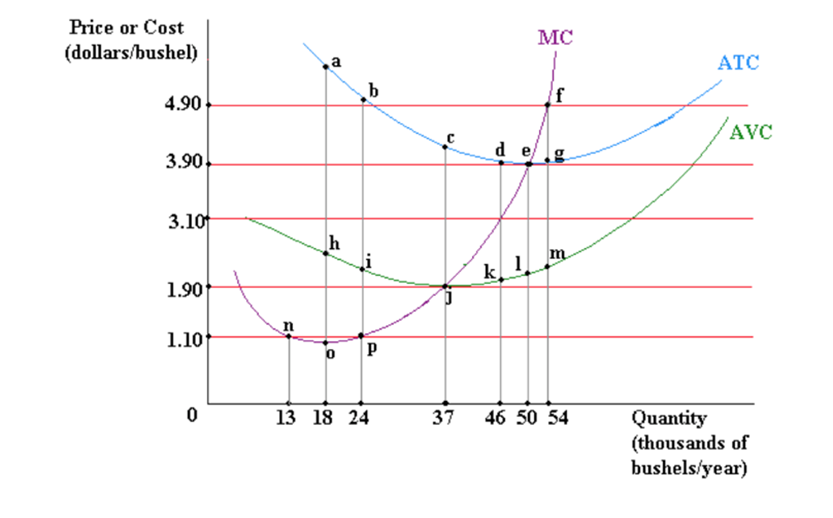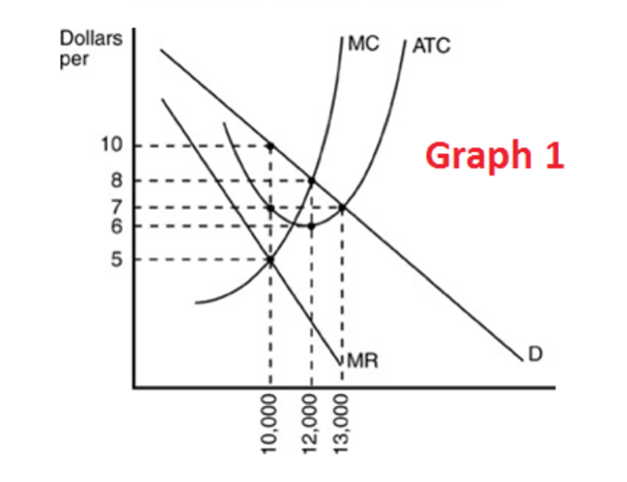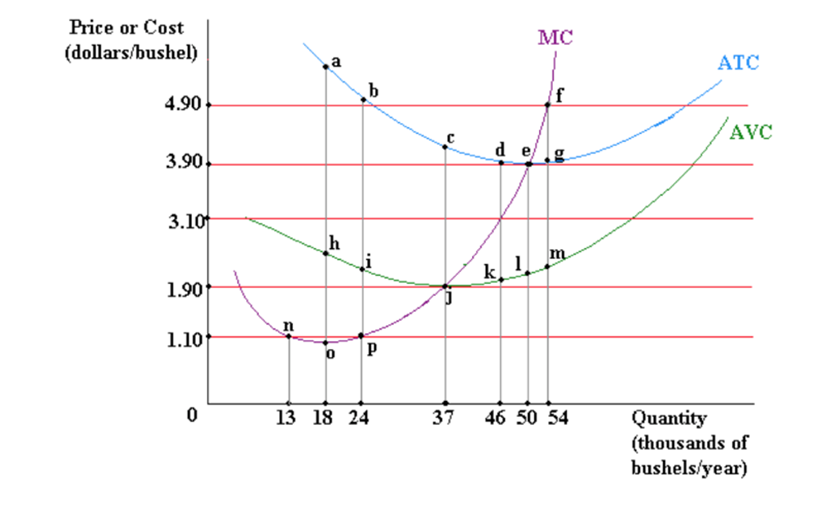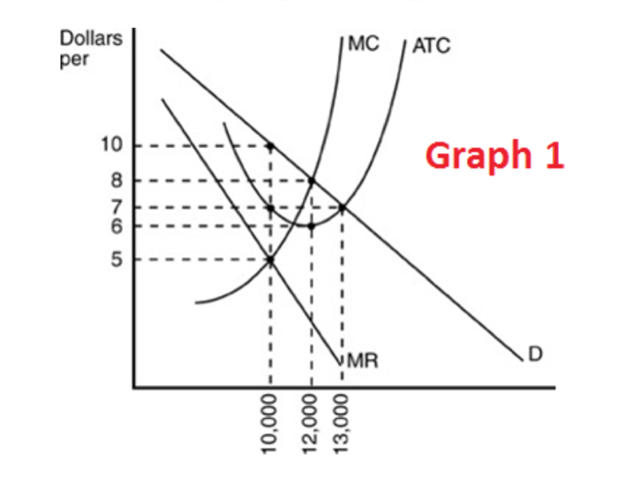Question
ANSWER WITH EXPLANATION Q1 Consider the following data regarding a monopoly firm and answer the questions given below it. 12 marks Quantity 1 2 3


ANSWER WITH EXPLANATION
Q1 Consider the following data regarding a monopoly firm and answer the questions given below it. 12 marks
| Quantity | 1 | 2 | 3 | 4 | 5 | 6 | 7 |
| AR | 96 | 87 | 78 | 69 | 60 | 51 | 42 |
| MR | 96 | 78 | 60 | 42 | 24 | 6 | -12 |
| AC | 144 | 90 | 70 | 63 | 60 | 58.5 | 57.86 |
| MC | 144 | 36 | 30 | 42 | 48 | 51 | 54 |
- What will be the price, output and profit/loss for a regulated monopolist that sets price according to Marginal Cost Pricing control system?
Price = Output = TR = TC =
Total Profit/loss = Profit/loss per unit =
- What will be the price, output and profit/loss for a regulated monopolist that sets price according to Fair Return Pricing control system?
Price = Q = AC =
TR = TC =
- Find the level of price, output and amount of profit/loss for an unregulated monopolist.
Price = Output = TR = TC =
Total Profit/loss = Profit/loss per unit =
Q2 Important differences exist between perfect competition and monopoly markets. Show your understanding of these differences by listing the following terms under the particular type of market structure. Enter appropriate number only under the specific type of market. 5 marks
1 Very large number of buyers and sellers 2 No close substitutes
3 Downward sloping demand curve or AR curve 4 Horizontal demand curve
5 Upward sloping total revenue curve 6 Firm is a price maker
7 AR = MR = Price 8 Atomistic competition
9 Single seller, many buyers 10 Patent rights
11 Barriers to entry 12 Firm is a price taker
| Perfect competition | Monopoly |
Q3Consider the following cost data for a perfectly competitive producer to answer the questions given below it. 12 marks
| Q (UNITS) | AFC ($) | AVC ($) | ATC ($) | MC ($) |
| 0 | ------ | ------ | ------ | ------ |
| 1 | 60 | 45 | 105 | 45 |
| 2 | 30 | 42.5 | 72.5 | 40 |
| 3 | 20 | 40 | 60 | 35 |
| 4 | 15 | 37.5 | 52.5 | 30 |
| 5 | 12 | 37 | 49 | 35 |
| 6 | 10 | 37.5 | 47.5 | 40 |
| 7 | 8.57 | 38.57 | 47.14 | 45 |
| 8 | 7.5 | 40.63 | 48.13 | 55 |
| 9 | 6.67 | 43.33 | 50 | 65 |
| 10 | 6 | 46.5 | 52.5 | 75 |
a) Will this firm produce in the short period if the product price is $62? What will be the total profits or loss of the firm?
TR = TC = Profit or loss =
Decision:
b) Will this firm produce in the short period if the product price is $41? What will be the total profits or loss of the firm?
TR = TC = Profit or loss =
Decision:
C) What will be the profit/loss of the firm if the product price is $34? Will it be beneficial to shut down the production? Why?
TR = TC = Profit or loss =
Decision:
Q4 Complete the following table and answer the questions given below. (Use TR and TC approach). Given price = $8 per unit. 10 marks
Output (units) (Q) | TR ($) | TC ($) | MR | PROFITS ($) |
| 0 | 18 | ---- | ||
| 1 | 20 | |||
| 2 | 22 | |||
| 3 | 24 | |||
| 4 | 27 | |||
| 5 | 31 | |||
| 6 | 37 | |||
| 7 | 46 | |||
| 8 | 58 | |||
| 9 | 90 | |||
| 10 | 150 |
What is the break-even level of output? Why?
What is total fixed cost (TFC)? Why?
What are the levels of output where the firm gets losses? Why?
What are the total costs where another break-even level of output may occur?
What is the per unit profit at profit maximizing output?
Q5Suppose that an unregulated price-discriminating monopolist has segregated its market into two groups of buyers as shown in the tables below for Market-1 and Market-2. Assume that MC is $13 in both markets and MC = AC at all output levels.
Buyers in Market-1:
| Price | Quantity Demanded | Total Revenue | Marginal Revenue | AC | TC | MC |
| $71 | 0 | ------- | 0 | ------ | ||
| 63 | 1 | |||||
| 55 | 2 | |||||
| 48 | 3 | |||||
| 42 | 4 | |||||
| 37 | 5 | |||||
| 33 | 6 | |||||
| 29 | 7 |
Buyers in Market-2
| Price | Quantity Demanded | Total Revenue | Marginal Revenue | AC | TC | MC |
| $115 | 0 | ------ | 0 | ------ | ||
| 100 | 1 | |||||
| 83 | 2 | |||||
| 71 | 3 | |||||
| 63 | 4 | |||||
| 55 | 5 | |||||
| 48 | 6 | |||||
| 42 | 7 |
- Complete the tables. 10 marks
- What price will the firm charge in each market? 2 marks
Price in Market-1= Price in Market- 2 =
- Based solely on these two prices, which market has the lower price elasticity of demand?Why? 3 marks
- What will be this monopolist's total economic profit in these two markets? 5 marks
Q6 Suppose that eight coffee shops have market share in the local coffee market as 28, 10, 15, 12, 8, 6, 4 and 17 percent (as percentages of total quantity of coffee sold).
- What is the fourfirm concentration ratio and HHI? What is the type of concentration? Why? 2 marks
Four Firm Concentration Ratio =
HHI =
Type of concentration:
- If the top 3 sellers combined to form a single firm, what would happen to the fourfirm concentration ratio and to the HHI? Is there any change in the type of concentration? Why? 2 marks
Four Firm Concentration Ratio =
HHI =
Type of concentration:
Q7 Consider the given diagram. Apply MC = MR approach for completing the table given below. 12 marks


Step by Step Solution
There are 3 Steps involved in it
Step: 1

Get Instant Access to Expert-Tailored Solutions
See step-by-step solutions with expert insights and AI powered tools for academic success
Step: 2

Step: 3

Ace Your Homework with AI
Get the answers you need in no time with our AI-driven, step-by-step assistance
Get Started


